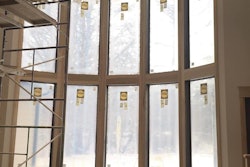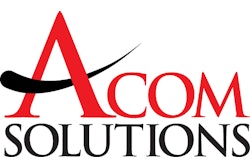Food service giant pilots system from 3PL Solutions, Sysco to monitor temperature, environmental conditions during food transport
Morgan Hill, CA — March 29, 2005 — Solution providers 3PL Solutions and Alien Technology this week said they have deployed a new radio frequency identification (RFID) and sensor-enabled system for cold chain management following successful field testing with SYSCO Corporation, North America's largest food service marketing and distribution organization.
3PL Solutions said it developed and tested its Distribution Access eXception (DAX) system to address the need for verification and documentation of product quality, shipment integrity and security for food products in transit.
The integrated system includes 3PL-developed applications software built on Alien's Battery Assisted Passive (BAP) RFID technology, multi-point sensors, as well as options for IrDA communications, GPS, and integrated RFID data capture. The DAX pilot program field testing was conducted by Alien Technology, 3PL Solutions and SYSCO in the SYSCO Frozen Foods and Produce supply chains and addressed dedicated, less-than-truckload (LTL) and inter-modal shipments.
"The RFID and sensor-enabled system provides cost-effective 'chain of evidence' documentation for food shipments, addressing anticipated regulatory requirements for better documentation of quality and safety control in food shipments, as well as improving methods to avoid waste and spoilage losses," the two solution providers said in announcing the new offering. "Today, when food products leave the controlled environment of a well regulated distribution center, there are few cost effective mechanisms to insure and document continuous environmental control and access control as the products are transported through the supply chain."
Field Tests Demonstrate Applications
"The multi-point, multi-sensor type data capture and recording capability, including temperature, humidity and more, combined with the unique ability to accurately capture container accesses makes this a breakthrough solution in the cold chain management arena," said Rick Clemons, vice president engineering at 3PL Solutions. "We could not think of a more exacting customer than SYSCO Corporation in the cold chain management arena, and were fortunate to have their support and attention to detail in all phases of the field testing."
"The field test demonstrated the viability of many potentially exciting applications for battery-assisted RFID and sensor-enabled systems," said Mark McDonald, director of product marketing at Alien Technology. "In environmentally sensitive supply chains, time relative and event driven data capture that monitors factors affecting shelf-life stability and cargo security has tremendous value. Alien's battery assisted passive RFID technology is a flexible and scaleable platform to address emerging markets and applications for RFID."
The DAX system was built using Alien's long-range, high performance 2450 MHz (microwave) frequency Battery Assisted Passive (BAP) system, including the ALR-2850 Reader and the ALB 2484 tags, which features the ability to record sensor inputs for later wireless retrieval. The tag can be interfaced with any external sensor such as temperature sensors, tamper indicators, or shock sensors. Because is uses low power backscatter technology, a small battery provides many years of operation, according Alien and 3PL.
Low Cost Electronic Bill of Lading
In addition, the two enablers said that a key feature of the DAX system is a low-cost means to develop an electronic bill of lading, the DAX Electronic Manifest, which provides essential records for producers, carriers and shippers of environmentally sensitive products.
Based on user input during the field test, 3PL Solutions and Alien Technology developed an IrDA (Infrared Data Association) query functionality for the DAX Container Integrity Tag (DAX-CIT) via a common Palm Pilot or similar low-cost IrDA enabled device. This functionality supplements the longer-range, RFID-based query capability, providing multiple methods for the receiving dock to interrogate the DAX-CIT for both environmental compliance and potentially unauthorized accesses during shipment. "With this ability, operations personnel can redirect a shipment away from the facility for closer examination prior to the onset of off-loading activity," Alien and 3PL said.
The DAX system incorporates a user controlled number and type of sensors deployed on a per-load basis which incorporates shipment details in the DAX sensor platform and provides real-time point-of-receipt "chain of evidence" documentation that can be reviewed and communicated as needed. "This is a key difference from current systems where the unit must be shipped back to owner to have the data downloaded," the two enablers said.
Additional Articles of Interest
For a contrary view of the future of the RFID market, see the article "The O'RFID Factor: A 'No Spin' Look at Where Radio Frequency Identification Is Headed," in the October/November 2004 issue of Supply & Demand Chain Executive.
For more information on trends relating to radio frequency identification, follow this link for an extensive listing of SDCExec.com articles, featuring the latest research findings on the RFID, including adoption, return on investment and barriers to implementation.
Morgan Hill, CA — March 29, 2005 — Solution providers 3PL Solutions and Alien Technology this week said they have deployed a new radio frequency identification (RFID) and sensor-enabled system for cold chain management following successful field testing with SYSCO Corporation, North America's largest food service marketing and distribution organization.
3PL Solutions said it developed and tested its Distribution Access eXception (DAX) system to address the need for verification and documentation of product quality, shipment integrity and security for food products in transit.
The integrated system includes 3PL-developed applications software built on Alien's Battery Assisted Passive (BAP) RFID technology, multi-point sensors, as well as options for IrDA communications, GPS, and integrated RFID data capture. The DAX pilot program field testing was conducted by Alien Technology, 3PL Solutions and SYSCO in the SYSCO Frozen Foods and Produce supply chains and addressed dedicated, less-than-truckload (LTL) and inter-modal shipments.
"The RFID and sensor-enabled system provides cost-effective 'chain of evidence' documentation for food shipments, addressing anticipated regulatory requirements for better documentation of quality and safety control in food shipments, as well as improving methods to avoid waste and spoilage losses," the two solution providers said in announcing the new offering. "Today, when food products leave the controlled environment of a well regulated distribution center, there are few cost effective mechanisms to insure and document continuous environmental control and access control as the products are transported through the supply chain."
Field Tests Demonstrate Applications
"The multi-point, multi-sensor type data capture and recording capability, including temperature, humidity and more, combined with the unique ability to accurately capture container accesses makes this a breakthrough solution in the cold chain management arena," said Rick Clemons, vice president engineering at 3PL Solutions. "We could not think of a more exacting customer than SYSCO Corporation in the cold chain management arena, and were fortunate to have their support and attention to detail in all phases of the field testing."
"The field test demonstrated the viability of many potentially exciting applications for battery-assisted RFID and sensor-enabled systems," said Mark McDonald, director of product marketing at Alien Technology. "In environmentally sensitive supply chains, time relative and event driven data capture that monitors factors affecting shelf-life stability and cargo security has tremendous value. Alien's battery assisted passive RFID technology is a flexible and scaleable platform to address emerging markets and applications for RFID."
The DAX system was built using Alien's long-range, high performance 2450 MHz (microwave) frequency Battery Assisted Passive (BAP) system, including the ALR-2850 Reader and the ALB 2484 tags, which features the ability to record sensor inputs for later wireless retrieval. The tag can be interfaced with any external sensor such as temperature sensors, tamper indicators, or shock sensors. Because is uses low power backscatter technology, a small battery provides many years of operation, according Alien and 3PL.
Low Cost Electronic Bill of Lading
In addition, the two enablers said that a key feature of the DAX system is a low-cost means to develop an electronic bill of lading, the DAX Electronic Manifest, which provides essential records for producers, carriers and shippers of environmentally sensitive products.
Based on user input during the field test, 3PL Solutions and Alien Technology developed an IrDA (Infrared Data Association) query functionality for the DAX Container Integrity Tag (DAX-CIT) via a common Palm Pilot or similar low-cost IrDA enabled device. This functionality supplements the longer-range, RFID-based query capability, providing multiple methods for the receiving dock to interrogate the DAX-CIT for both environmental compliance and potentially unauthorized accesses during shipment. "With this ability, operations personnel can redirect a shipment away from the facility for closer examination prior to the onset of off-loading activity," Alien and 3PL said.
The DAX system incorporates a user controlled number and type of sensors deployed on a per-load basis which incorporates shipment details in the DAX sensor platform and provides real-time point-of-receipt "chain of evidence" documentation that can be reviewed and communicated as needed. "This is a key difference from current systems where the unit must be shipped back to owner to have the data downloaded," the two enablers said.
Additional Articles of Interest
For a contrary view of the future of the RFID market, see the article "The O'RFID Factor: A 'No Spin' Look at Where Radio Frequency Identification Is Headed," in the October/November 2004 issue of Supply & Demand Chain Executive.
For more information on trends relating to radio frequency identification, follow this link for an extensive listing of SDCExec.com articles, featuring the latest research findings on the RFID, including adoption, return on investment and barriers to implementation.
- More articles about Alien Technology.










